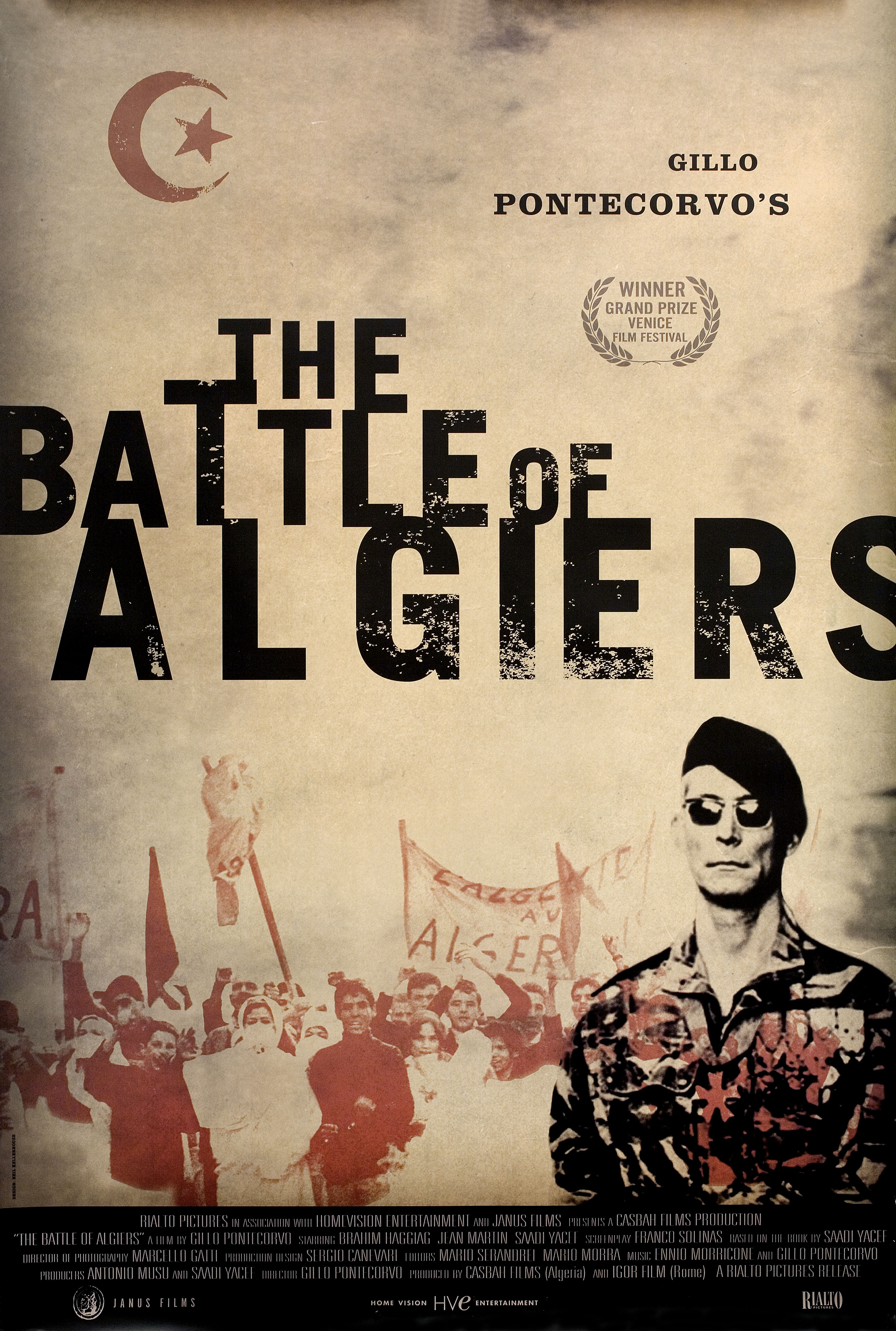[VIDEO] The Persistent Timeliness of The Battle of Algiers

For the 50th anniversary of The Battle of Algiers, a 4k restoration of the iconic and provocative film is being released theatrically. Often cited as one of the most influential works in political cinema, Algiers is a film that consistently finds resonance with new times, as its themes of colonialism, revolution, terrorism, and torture have only become more and more relevant in modern time. One of my professors once called it “a guide to starting a revolution.” You can watch the trailer here.
The Algerian-Italian co-production was shot on location largely with hand-held cameras, and despite not using a foot of newsreel many praised it for it’s documentary-like realism in depicting the gruesome violence between French paratroopers and the National Liberation Front.
Originally banned in France, some identify a pro-Arab bias within the film, but this has been debated. Creator of Casbah films, former member of the FNL, writer of the memoir Souvenirs de la Bataille d’Ager, and actor Saadi Yacef, however, says his ultimate goals was “an objective equilibrated film that is not a trial of a people or of a nation, but a heartfelt act of accusation against violence and war.” Indeed, the film candidly addresses terrorism on both sides and critics have noted the film’s moral ambiguity. The film’s accuracy was also notably praised by Lieutenant Colonel Roger Trinquier, author and veteran of the 10th division of paratroopers.
That’s not to say it goes without some criticism, as Marnia Lazreg in “Doing Torture in Film” notes the portrayal of torture “deals instead with cliches such as the idea that torture targets men, not women, that it can be effective in dismantling an elaborate underground organization, that it is not a major preoccupation of those it targets, and that it is not terror producing, unlike explosions” (261). Donald Reig also notes that omitting nationalist Yacef Saâdi’s encounter with French Resistance heroine Germaine Tillion has some consequences.
But there’s already a lot out there about the endeavor and brilliance of this film, so I want to talk about why it’s worth rewatching Battle of Algiers now, and what we can take away from this story. Diving a bit into the history, audiences of Battle of Algiers have always found reflections of their own wars within the on-screen conflict. While obvious not 1:1 comparisons, viewers in the ’60s saw parallels to the war in Vietnam and the civil rights movement. Shortly after the invasion of Iraq in 2003, the Pentagon notoriously held a private screening for military personnel with a flyer that said “How to win a battle against terrorism and lose the war of ideas. Children shoot soldiers at point-blank range. Women plant bombs in cafés. Soon the entire Arab population builds to a mad fervor. Sound familiar?” Even before it’s creation, Pontecorvo and collaborator Franco Solinas was “convinced the anti-colonial struggle was an urgent and important struggle against ‘an invincible capitalism in Italy.’”
Watching the film this week at New York’s Film Forum, it was impossible not to be aware of the fact that a bomb went off in Manhattan only a few days prior. As an Arab worker is falsely accused of killing a policeman by a group of French people and a mob directs their anger about terrorism towards a young Arab boy, it’s impossible not to see parallels to America’s history of assigning danger to non-white bodies through profiling, police brutality, and other forms of physical and non-physical violence.
A famous line from leader Ben M’Hidi states “It’s hard to start a revolution. Even harder to continue it. And hardest of all to win it. But, it’s only afterwards, when we have won, that the true difficulties begin.” Director Pontecorvo called his film’s “choral protagonist” and “hero” the 80,000 men, women, and children of Casbah and the film’s use of telephoto lenses were made to “emphasize collective effort rather than individual heroism.”
If that’s where we’re meant to see ourselves, the Battle of Algiers not only serves as a teaching moment for an important period in history, but as an opportunity to examine our current state of politics. An 1967 review by the NY times said that by ending the film with Algeria’s independence in 1962, the film gives “symbolic hope for all who struggle for freedom,” and with the violence we’re seeing in the news right now, we can definitely use some hope.
If you’ve never seen it, The Battle of Algiers (4K Restoration) will be released theatrically by Rialto Pictures on October 7 at New York’s Film Forum, Landmark’s Nuart in Los Angeles and E Street Cinema in Washington, D.C., followed by a major city rollout through the fall. It’s a great opportunity and if you have watched it, it’s definitely worth another viewing on the big screen.
Want more stories like this? Become a subscriber and support the site!
—The Mary Sue has a strict comment policy that forbids, but is not limited to, personal insults toward anyone, hate speech, and trolling.—
Follow The Mary Sue on Twitter, Facebook, Tumblr, Pinterest, & Google+.
Have a tip we should know? tips@themarysue.com